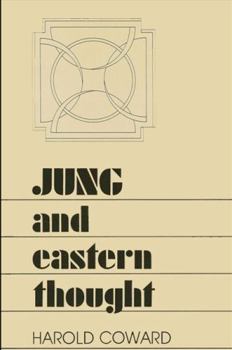Jung and Eastern Thought
Select Format
Select Condition 
Book Overview
Jung and Eastern Thought is an assessment of the impact of the East on Jung's life and teaching. Along with the strong and continuing interest in the psychology of Carl Jung is a growing awareness of the extent to which Eastern thought, especially Indian ideas, influenced his thinking. This book identifies those influences that he found useful and those he rejected. In Hindu, Buddhist, and Taoist cultures, yoga is a central conception and practice...
Format:Hardcover
Language:English
ISBN:0887060528
ISBN13:9780887060526
Release Date:July 1985
Publisher:State University of New York Press
Length:234 Pages
Weight:1.05 lbs.
Customer Reviews
2 ratings
Jung and Eastern Thought
Published by Thriftbooks.com User , 16 years ago
The text was very helpful in understanding many significant differences between the Eastern and Western thought in regards to spiritual consciousness. Jung helps us understand the Western unconscous mind and its relationship to the pro and cons of the practice of Yoga.
Excellent comparison of Jung mostly with Hindu thought
Published by Thriftbooks.com User , 19 years ago
This is a well-written book balancing Jungian & Eastern thought in an unbiased manner-both similarities & differences. It covers yoga (Patanjali's)/Taoism; alchemy/Gnosticism, the collective unconscious=Self/ Brahman, synchronicity; mandalas/quaternity/circumambulation, karma/reincarnation, prana/libido/prajna, & Upanishads/kundalini. It has general topics & a very detailed comparison of Jung/Patanjali's yoga with considerable discussion of the Upanishads. Thus, it focuses mainly on Hinduism. There are a great many parallels, if not identities, between numerous concepts & views: p. 5: quoting Jung: "Taoist philosophy as well as yoga have very many parallels with the psychic processes we can observe in Western man." Perhaps the main similarities lie in the extensive comparisons of Jung's libido vs. yoga's prana, self-knowledge & prajna, mandalas & circumambulation as symbols of wholeness/Self, the relationship between the self & the All, & yoga vs. psychotherapy. It is erudite, convincing, yet readable. Main differences between Jung & Eastern thought include Jung's view of the 2 directions-[Western extroverted sensing thinking judging (ESTJ) vs. Eastern introverted intuitive feeling perceiving (INFP)]: p. 8: "The truth of the East is not in the Eastern way itself, but in the demonstrated need for a balance between intellect and intuition, between thinking and feeling...To be overbalanced in any one aspect of consciousness is a sign of immaturity and "barbarism", to use Jung's word for it. Consequently, it is not the case that the modem West should give up its highly developed scientific intellect-only that the intuitive and feeling aspects of psychic function must achieve an equally high development in Western consciousness so that a creative balance can be achieved, and a widening of consciousness result. While Jung openly admired the Eastern yoga principle of inclusiveness and balance between the opposing aspects of psychic function, it is clear that he felt that the East had overstressed the intuitive, just as the modem West had over-developed the scientific." p. 14: "In Jung's view any unbalance in the split of psychic energy, while it may produce the short-term gains of rigorous specialization (e. g., modern Western technology), will, in the long run, prove detrimental." This is the basis for Jung's several arguments against Westerners directly adopting Eastern methods: p. 18: "Here Jung again sounds his warning that the solution for the Westerner cannot be found by taking up the direct practice of Eastern yoga. Says Jung, the neurosis or split within consciousness would then simply be intensified But what can be learned from the East is a general approach to be adopted so that the split, the imbalance between the opposites may be brought into harmony." p. 22: "because the Westerner typically does not know his own unconscious, it is quite likely that when he finds the East strange and hard to understand he will pr





